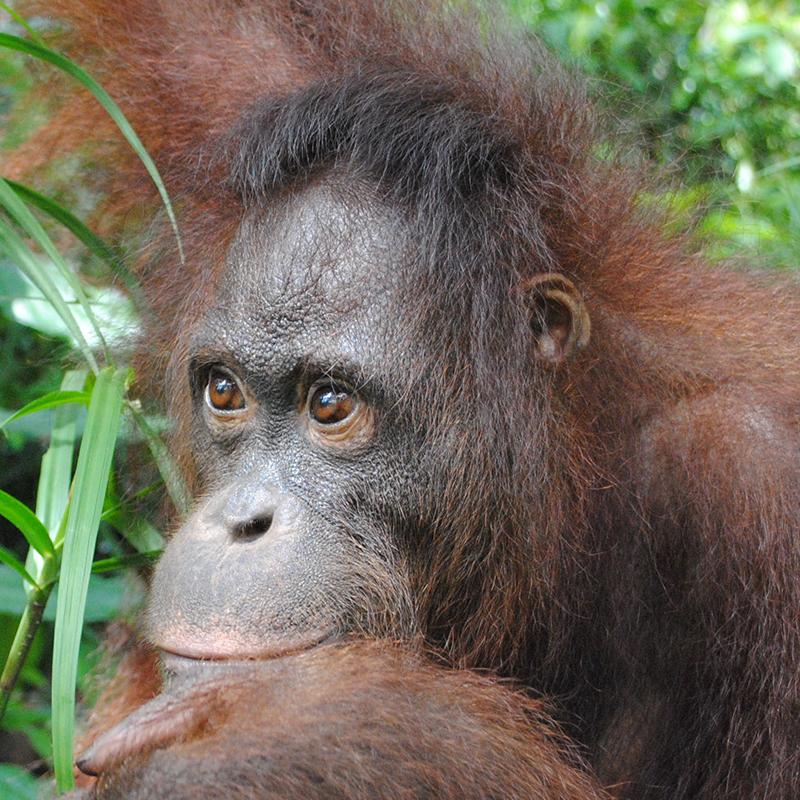 |
|
- - - - - - - - - - - -
IN THIS ISSUE
|
 |

"Berman is a beautiful orangutan with plentiful bright orange hair. A tiara of darker orange hair frames the front crest of her head. While manoeuvring through the matrix of branches and trees, Berman is followed by a shadow of orange as her hair flows behind her. Her symmetrical facial features are accented with light soft hairs that gently grow around her mouth, and large captivating oval eyes. On sunny days in the forest, Berman's dark brown eyes transform into light honey shades and sometimes even an intriguing hue of blue-grey.
During daily release to the Learning Forest, Berman commences her stay by spending time on the forest floor below the canopy. Once she has warmed up to the idea of climbing, she attains height fast. She moves in stretched sweeps and seems to always choose the long route to reach her destination. It is as if she is interested in the journey as much as its eventual goal.
She frequently seeks out a particular tree with an arched trunk curved like a wooden bow. It is the perfect shape to clasp in her hands and spin around on before leaning away to survey her surroundings. While her peers rush to consume succulent leaves or to climb larger trees, Berman pauses to examine the many organic objects that she passes by in her arboreal journey. Through a sustained gaze, happily perched from afar, she observes the forest activity around her. ..."
|
|
V O L U N T E E R
We need volunteers! Join OFI in a 3 week Construction Volunteer Program with the objective of building or repairing OFI structures that are essential to conservation, research and education. Team 1 starts May 28th, 2017. For more info and to apply, click here.
- - - - - - - - - - - -
|
|
IN THE COMMUNITY

Thank you to everyone who visited OFI at Children's Earth Day 2017, hosted by STAR Eco Station. We had many inquisitive and caring visitors, young and adult, who wanted to learn more about orangutans and do their part to help out. We always appreciate the opportunity to educate and spread the word about our red-haired cousins!

|
|
- - - - - - - - - - - -
STAY CONNECTED WITH OFI
- - - - - - - - - - - -
|
Our sincerest thanks for being a reader of OFI's Eyes on the Forest newsletter.
Enjoy these stories? Know someone else who would, too? Please share this newsletter with your friends and family!
You can find out more about OFI & our work at our website:
|
|
|
 |

|
F E A T U R E
by Noelle Tankard
|
|
|
 |
|
 |
OFI President, Dr. Biruté Mary Galdikas, wades through the swamp. |
A large part of OFI's work to save orangutans from extinction involves protecting the forests of Borneo. Orangutans must have a place to live.
Protecting the land is a big task, and it takes many forms. OFI works with the forestry department and police to coordinate patrolling efforts in Tanjung Puting National Park against poachers, illegal loggers and miners, arsonists and more. We purchase land before it can be sold to a palm oil (or other agricultural) corporation to be converted to plantations. We patrol the land we have purchased. We help negotiate legal status for protected land. We monitor the damage from the dry-season fires, which are more intense every year. We plant trees to rejuvenate the burned areas. When communities or individuals wish to sell us their land but do not have legal proof of ownership, we provide assistance with procuring the documentation. When individuals within a community dispute who owns the land, we help resolve the conflicts. And, as always, we continue to patrol.
But all of these actions start the same way: we must survey the land.
OFI staff undertake survey missions to ensure the piece of land in question is, in fact, in the general vicinity at which it was alleged to exist, to determine GPS coordinates of its boundaries, to place it on a map, and assess the biodiversity. The objectives may be simple but achieving them is far from an easy task when you are working in a place that is, quite literally, off the map.
Drone footage shot by OFI Field Director Pak Fajar in Tanjung Puting National Park near to Camp Leakey.
In Central Kalimantan (Borneo), where OFI works, even accessing land can be a challenge. Much of the land we are surveying - particularly the forested land that has been offered to us for sale - is difficult to reach. Transit alone can encompass an all-day expedition. Roads good enough for cars can only take you so far. OFI's Survey Team must leave the cars and, when they're lucky, take off-road motorbikes for a stretch. When they're not lucky, they're on foot for miles. Sometimes boats are the only way in. Many of the streams are too small for speedboats. When the only option is to rent a small wooden canoe from an enterprising local villager, our team can only hope the retro-fitted engine (often borrowed from a motorbike) is in good repair.
|
|
 |
| Pak Fajar operates a drone to survey land in Tanjung Puting National Park near to Camp Leakey. |
 |
Once they reach the land, the real work begins. In areas with extensive undergrowth (like the Rawa Kuno area of OFI's Orangutan Legacy Forest), a man with a machete must be in the lead, hacking a path as he goes. Between one step and the next, the survey teams can find themselves in swamp up to their hips as the terrain changes underfoot with little warning above.
OFI's survey teams are armed with cutting edge technology (drones powered by smartphones, handheld GPS devices) along with some of the oldest tools known to humankind (machetes and rope woven as needed on-site from vines). It's the ultimate blend of old and new as OFI's staff jerry-rig malfunctioning engines, identify the plants their Dayak grandparents taught them, read animal tracks on the ground and on the trunks of trees, spot orangutan nests in the canopy, draw diagrams in the sand with sticks to debate directions with the local accompanying the team, and collect aerial photography data with a drone in the sky.
|

|
P H O T O E S S A Y
Written by Deya Ward
Photos by Ibu Evi
|
|
|
If you spend ten minutes in the forests of Borneo, you might not see the thousands of insects that surround you, but you will hear them. Life bursts from every inch of this biologically rich environment, from the branches that provide highways for ants, to the sheltering cracks and crevices in the trees, to the shady undersides of leaves.
 |
|
 |
Howard clings to OFI caregiver, Ibu Evi.
|
Ibu Evi, the coordinator of Pondok Dua, one of our nursery facilities, is a compassionate caregiver and a comfort for many of the young orangutans here at the Orangutan Care Center and Quarantine (OCCQ) in Pasir Panjang, Kalimantan Tengah (Central Indonesian Borneo). She also is an exceptional photographer of some of the smaller, mesmerizing creatures she comes into contact with during daily releases with the orangutans. For a number of years, while following orangutans as they explore and learn, she has captured detailed photos of the insects of Borneo.
Caterpillars are what Ibu Evi discovers most frequently in the forest. They are eating machines and slow to move as they concentrate on eating. Leaves perforated like giant honeycombs are the souvenirs of their slow travels through the forest. The sheer mystery of their future transformation is captivating. In many traditions across the globe, this metamorphosis is seen as an icon of hope.
See the full Photo Essay here.
|
|
Color Sergeant Butterfly Caterpillar
|
|
|
Striped Blue Crow Butterfly Caterpillar
|
|
|
| |
|